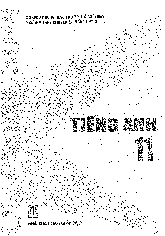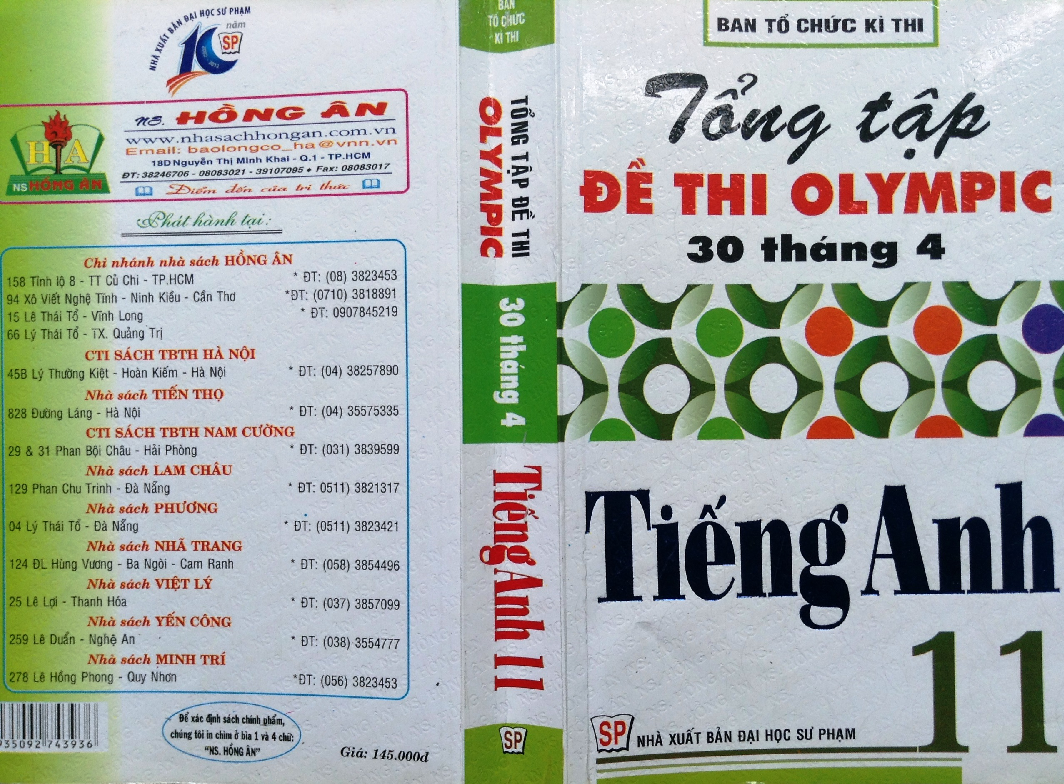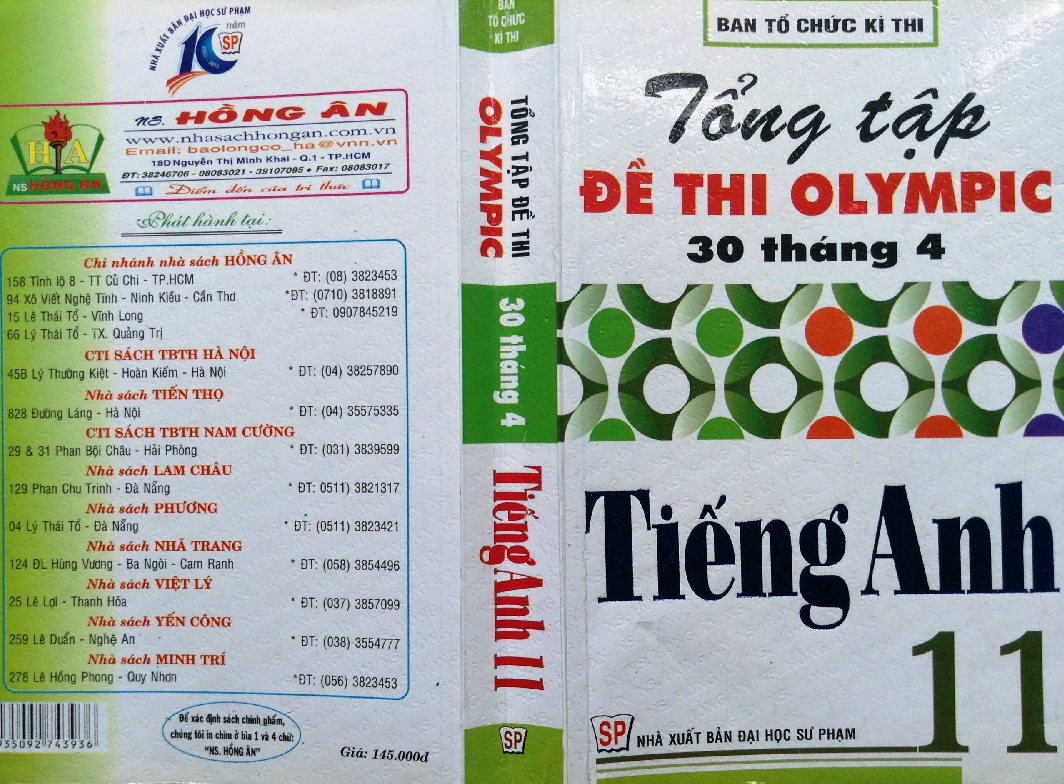











Preview text:
SỞ GIÁO DỤC VÀ ĐÀO TẠO TỈNH ĐẮK LẮK
TRƯỜNG THPT TH CAO NGUYÊN
KÌ THI OLYMPIC 10-3 LẦN III
ĐỀ THI ĐỀ NGHỊ MÔN: TIẾNG ANH LỚP 11 ĐỀ THI VÀ ĐÁP ÁN
PHẦN A: MULTIPLE CHOICE (40 PTS) I. PHONOLOGY (5PTS):
Choose the word whose underlined part is pronounced differently from that of the others. 1. A. experience B. expensive C. exhausted D. exclusive 2. A. vision B. measure C .usually D. pleasant 3. A. clean B. death C. head D. heavy 4. A. dinosaur B. launch C. nausea D. laurel 5. A. equation B. education C. contribution D. nomination 1.C 2.A 3.A 4.B 5.A
Choose the word which is stressed differently from the other three. 1. A. trigonometry B. explanatory C. immediately D. democracy 2. A. legislature B. repository C. magnificent D. mistake 3.
A. argumentativeB. psychological C. contributory D. hypersensitive 4. A. photograph B. payroll C. accent D. regretful 5. A. majority B. ceremony C. astronomy D. investiture 1.A 2.A 3.C 4.D 5.B II. WORD CHOICE: (5PTS)
1.If Harold………….with his piano playing, he could eventually reach concert standard. A. sustains
B. perseveres C. maintains D. survives
2. Anna is a very nervous child and she’s very………………….of strangers. A. terrified B. frightened C. petrified D. horrified
3. I love the painting of an ald man. He has such a beautiful……………smile. A. childhood B. childish C. childless D. childlike
4. She caught a ……………………of the thief as he made his get- away. A. glance B. sight C. glimpse D. flash
5. Frank has a house in the ……………….. A. outskirts B. edges C. limits D. suburds
6. The film lasted every three hours with…………….of 15 minutes between part one and part two. A. a pause B. an interruption C. an interval D. a stop
7. The person who writes symphonies or concertos is a …………….. A. composer B. conductor C. pianist D. playwright
8. Is it far to Stambord? It’s only………………..from here. A. stone’s cut B. bird’s eye view C. short cut D. step in the right direction
9. She loved tennis and could watch it till the _____ came home. A. she B. everyone C. horses D. cows
10. He set one alarm-clock for five o’clock and the other for five past so as to _____ that he did not oversleep. A. assure B. ensure C. insure D. reassure 1.B 2. A 3. D 4. C 5. D 6. C 7. A 8. A 9. D 10. B
III. STRUCTURE AND GRAMMAR: (5PTS)
Choose the best options to complete the following sentences.
11. It was only _____ he told me his surname that I realised that we had been to the same school . A. then B. until C. as soon as D. when
2. He got an excellent grade in his examination _____ the fact that he had not worked particularly hard . A. on account of B. because C. in spite of D. although
3. It turned out that we ______ rushed to the airport as the plane was delayed by several hours . A. hadn’t B. should have C. mustn’t D. needn’t have
4. It was a service…………..I will be enternally grateful. A. to which B. for which C. to whom D. for whom
5. Tom and Mary never came to class late. .................................. A. So did we B. Neither did we C. We did either D. Neither we did
6. I remember ....................to Hanoi when I was a very small child. A. taking B. to take C. to be taken D. being taken
7. Helen asked me ......................the film called “Star Wars”. A. if I had seen
B. have I seen C. have you seen D. if had I seen
8. At first I found ......................to get used to .....................on the other side of the road. A. it difficult - drive B. difficult - drive C. it difficult - driving D. difficult- driving
9. Had we known your new address, we .................to see you.
A. would have come B. will come C. would come D. came
10. .................had they recovered from the first earthquake when they felt the second tremor. A. Scarely B. Never C. No sooner D. Just 1.D 2. C 3. D 4. B 5. B 6. D 7. A 8. C 9. A 10. A
IV. PREPOSITIONS AND PHRASAL VERBS: (5PTS)
1. The government is thinking of bringing………..a law to make it compulsory for cyclists to wear crash helmets. A. on B. up C. in D. round
2. It's nice to know that I can trust you to help me when I need it. A. count on B. check over C. make friends D. get over
3. I missed the bus and couldn't get to the office until ten o'clock. A. reach B. go C. arrive D. come
4. The politician went _______ his speech before the important presentation. A. on B. off C. over D. away
5. The speaker kept on talking even though most of the audience had left. A. went on B. continued C. went over D. A and B are right
6. I can count on my parents to help me in an emergency. A. look for B. depend on C. go on D. try on
7. No smoking is allowed in here. Please _______ your cigarette. A. out off B. put out C. put away D. put on
8. You should never sign any legal paper without checking it _______ first. A. up B. in C. out D. over
9. Every morning the company workers have time _______ for a coffee break. A. in B. out C. off D. over
10. Several workers took the afternoon _______ to go to a baseball game. A. over B. off C. after D. part in 1.C 2.A 3. A 4. C 5. D 6. B 7. B 8. D 9. C 10. B V. READING PASSAGE (10PTS)
Read the text below and choose the best answer to each question. Passage 1:
Continents and ocean basins represent the largest identifiable bodies on Earth. On the
solid portions of the planet, the second most prominent features are flat plains, elevated
plateaus, and large mountain ranges. In geography, the term “continent” refers to the surface
of continuous landmasses that together comprise about 29.2% of the planet’s surface. On the
other hand, another definition is prevalent in the general use of the term that deals with
extensive mainlands, such as Europe or Asia, that actually represent one very large landmass.
Although all continents are bounded by water bodies or high mountain ranges, isolated
mainlands, such as Greenland and India-Pakistan areas are called subcontinents. In some
circles, the distinction between continents and large islands lies almost exclusively in the size of particular landmass.
The analysis of compression and tension in the earth’s crust has determined that
continental structures are composed of layers that underlie continental shelves. A great deal of
disagreement among geologists surrounds the issue of exactly how many layers underlie each
landmass because of their distinctive mineral and chemical composition. It is also quite
possible that the ocean floor rests on the top of unknown continents that have not yet been
explored. The continental crust is believed to have been formed by means of a chemical
reaction when lighter materials separated from heavier ones, thus settling at various levels
within the crust. Assisted by the measurements of the specifics within crust formations by
means of monitoring earthquakes, geologists can speculate that a chemical split occurred to
form the atmosphere, sea water, and the crust before it solidified many centuries ago.
Although each continent has its special features, all consist of various combinations of
components that include shields, mountain belts, intra-cratonic basins, margins, volcanic
plateaus, and block-vaulted belts. The basic differences among continents lie in the proportion
and the composition of these features relative to the continent size. Climatic zones have a
crucial effect on the weathering and formation of the surface features, soil erosion, soil
deposition, land formation, vegetation, and human activities.
Mountain belts are elongated narrow zones that have a characteristic folded sedimentary
organization of layers. They are typically produced during substantial crustal movements,
which generate faulting and mountain building. When continental margins collide, the rise of
a marginal edge leads to the formation of large mountain ranges, as explained by the plate
tectonic theory. This process also accounts for the occurrence of mountain belts in ocean
basins and produces evidence for the ongoing continental plate evolution.
Question 1. What does this passage mainly discuss?
A. Continental drift and division
B. Various definitions of the term “continent”
C. Continental structure and crust
D. Scientific analyses of continental crusts
Question 2. According to the passage, how do scientists define continents?
A. As masses of land without divisions B. As extensive bodies of land
C. As the largest identifiable features
D. As surgical compositions and ranges
Question 3. In line 6, the word “bounded” is closest in meaning to ___________. A. covered B. convened C. delimited D. dominated
Question 4. The author of the passage implies that the disagreement among scientists is based on the fact that
A. each continent has several planes and shelves B. continents have various underlying layers of crust
C. continents undergo compression and experience tension
D. continents have different chemical makeup
Question 5. The word “specifics” in the passage is closest in meaning to_____. A. specialities B. speculations C. exact details D. precise movements
Question 6. The word “it” in line 18 refers to A. a chemical split B. the crust C. the atmosphere D. sea water
Question 7. The author of the passage implies that ___________.
A. it is not known exactly how the continental crust was formed
B. geologists have neglected the exploration of the ocean floor
C. scientists have concentrated on monitoring earthquakes
D. the earth’s atmosphere split into water and solids
Question 8. According to the passage, what are the differences in the structure of continents?
A. The proportional size of continents to one another
B. Ratios of major components and their comparative size
C. The distinctive features of their elements D. Climatic zones and their effect on the surface features
Question 9. The author of the passage implies that ___________.
A. the process of mountain formation has not been accounted for
B. mountain ranges on the ocean floor lead to surface mountain building
C. faulting and continental margins are parts of plate edges
D. the process of continent formation has not been completed
Question 10. The word “evidence” in the last line is closest in meaning to ___________. A. eventually B. confirmation C. exemplification D. challenge Đáp Án 1.C 2.A 3C 4D 5C 6B 7A 8 B 9D 10 B Passage 2:
In this era of increased global warming and diminishing fossil fuel supplies, we must
begin to put a greater priority on harnessing alternative energy sources. Fortunately, there are
a number of readily available, renewable resources that are both cost- effective and earth –
friendly. Two such resources are solar power and geothermal power. Solar energy, which
reaches the earth through sunlight, is so abundant that it could meet the needs of worldwide
energy consumption 6,000 times over. And solar energy is easily harnessed through the use of
photovoltaic cells that convert sunlight to electricity. In the US alone, more than 100, 000
homes are equipped with solar electric systems in the form of solar panels or solar roof tiles.
And in other parts of the world, including many developing countries, the use of solar system is growing steadily.
Another alternative energy source, which is abundant in specific geographical areas, is
geothermal power, which creates energy by tapping heat from below the surface of the earth.
Hot water and steam that are trapped in underground pools are pumped to the surface and
used to run a generator, which is produces electricity. Geothermal energy is 50,000 times
more abundant than the entire known supply of fossil fuel resources. And as with solar power,
the technology needed to utilize geothermal energy is fairly simple. A prime example of
effective geothermal use is in Iceland, a region of high geothermal activity where over 80
percent of private homes are heated by geothermal power. Solar and geothermal energy are
just two of promising renewable alternatives to conventional energy sources. The time is long
overdue to invest in the development and use of alternative energy on global scale.
Question 1. What is the main topic of this passage ?
A. The benefits of solar and wind power over conventional energy sources.
B. How energy resources are tapped from nature.
C. Two types of alternative energy sources that should be further utilized.
D. Examples of the use of energy sources worldwide.
Question 2. According to the passage, why should we consider using alternative energy sources?
A. Because fossil fuels are no longer available.
B. Because global warming has increased the amount of sunlight that reaches the earth.
C. Because they are free and available worldwide.
D. Because conventional energy resources are being depleted, and they cause environmental damage.
Question 3. Which of the following words could best replace the word “ harnessing” A. Capturing B. Harassing C. Depleting D. Exporting
Question 4. According to the passage, what can be inferred about solar roof tiles?
A. They are being used in many undeveloped countries. C. They are more expensive than solar panels.
B. They can convert geothermal energy to electricity.
D. They contain photovoltaic cells.
Question 5. According to the passage, how is solar energy production similar to geothermal energy production ?
A. They both require the use of a generator.
B. They both use heat from the earth’s surface.
C. They both require fairly simple technology. D. They are both conventional and costly.
Question 6. Where is the best place in the passage to insert the following sentence:
“ Although the US is not utilizing geothermal resources to this extent, the Western US has a
similar capacity to generate geothermal power”
A. after the phrase ” earth-friendly”
B. after the phrase “ growing steadily”
C. after the phrase “ by geothermal power”
D. after the phrase “ global scale”
Question 7. According to the passage, which of the following is true about solar power ?
A. There is very little of it available in Iceland.
B. It is being used in 100, 000 private homes worldwide.
C. It is 6,000 times more powerful than energy from fossil fuels.
D. There is enough of it to far exceed the energy needs of the world.
Question 8. What can be inferred about the use of geothermal energy in Iceland?
A. It is widely used form of energy for heating homes.
B. Twenty percent of the geothermal energy created is used to heat businesses.
C. It is not effective for use in private homes.
D. It is 80 times more effective than traditional forms of energy.
Question 9. What does the author imply about alternative energy sources ?
A. Many different types of alternative energy sources exist.
B. Most alternative energy sources are too impractical for private use.
C. Alternative energy is too expensive for developing countries to produce.
D. Solar and geothermal energy are the effective forms of alternative power
Question 10. What best describes the author’s purpose in writing the passage ?
A. To warn people about the hazards of fossil fuel use.
B. To describe the advantages and disadvantages of alternative energy use.
C. To convince people of the benefits of developing alternative energy sources.
D. To outline the problems and solutions connected with global warming. Đáp án
1.C 2.D 3.A 4. D 5.C 6.C 7.D 8.D 9.A 10.C
VI. GUIDED CLOZE (10 PTS)
Read the text below and decide which answer best fits each space. Passage 1:
Clean freshwater resources are essential for drinking, bathing, cooking, irrigation,
industry, and for plant and animal (1)_______. Unfortunately, the global supply of freshwater
is (2)_______ unevenly. Chronic water shortages (3)_______ in most of Africa and drought is
common over much of the globe. The (4)_______ of most freshwater supplies - groundwater
(water located below the soil surface), reservoirs, and rivers - are under severe and
(5)_______ environmental stress because of overuse, water pollution, and ecosystem
degradation. Over 95 percent of urban sewage in (6)_______ countries is (7)_______
untreated into surface waters such as rivers and harbors. About 65 percent of the global
freshwater supply is used in (8)_______ and 25 percent is used in industry. Freshwater
(9)_______ therefore requires a reduction in wasteful practices like (10)_______. irrigation,
reforms in agriculture and industry, and strict pollution controls worldwide. Question 1: A. survive B. survived C. surviving D. survival
Question 2: A. delivered B. distributed C. provided D. given Question 3: A. exist B. lie C. show D. stay
Question 4: A. resources B. springs C. sources D. starting
Question 5: A. increasing B. growing C. climbing D. ascending Question 6: A. growing B. miserable C. poverty D. developing
Question 7: A. recharged B. discharged C. charged D. discharging Question 8: A. farming B. planting C. agriculture D. growing
Question 9: A. reservation B. conservation C. preservation D. retention
Question 10: A. ineffective B. illogical C. irrational D. inefficient Đáp án 1.D 2B 3A 4C 5A 6D 7B 8C 9B 10A Passage 2:
My wife and I have always enjoyed travelling by sea, and last year we decided to go
for a Mediterranean cruise. …………… (1) our holiday was rather expensive we thought that
the high standard of accomadation, the first-class food and the many interesting places we saw
were well…………… (2) the price we paid.
We found that most of the other passagers were friendly and interesting, but there was a man,
Mr James, who irrated and annoyed us, and not ……………(3) us but all the others who
shared our table at dinner. Whatever subject we talked about, it seemed that he was an
expert……………(4). He, had, apparently, read more books, visited more countries and
studied more languages, than anyone else. After a few days, we ate our meals in
……………(5), because nobody wanted to begin a conversation that would soon be taken ……………(6) by this man
Then my wife had an idea. Fortunately, the ship had a library, and she suggested that
we…………… (7) think of an unsual subject, look it up in encyclopaedia and then talk about
it at dinner. If it were unusual enough Mr James could not……………(8) know anything
about it. The subject we chose was “ English Agriculture in the Eleventh Century”. At diner
that night we discussed this subject with …………… (9) enthusiam. Mr James was silent. We
realised we had at last……………(10) to find something he knew nothing about. Đáp án
1. Although 2. Worth 3. Only 4. At/on/in 5. Silence 6. Over 7. Should 8. possibly 9. Great 10. happened B. WRITTEN TEST (70PTS) I. CLOZE TEST (70PTS):
Read the text below and think of the word which best fits each space. Use only ONE WORD for each space. Passage 1: SKATEBOARD
Some sports or activities have traditionally been (1)………. with people, even
though it is not always clear why. Skateboarders, for instance, are expected to
(2)……….teenagers wearing clothes four sizes too big for them. When you come to think
of it, there’s nopractical reason why people over the age of 21 shouldn’t take up the sport.
Skateboarding involves a certain (3)………. of falling off the board,
(4)……..can of course be painful, but this also (5)………. to other sports like skiing or
surfing. Sports should not be restricted (6)…………teenagers. There is (7)……….wrong
with a grown - up gliding down the road on his or her board.
(8)……………the same time, I must confess that I felta certain sympathy for
my niece Emily when her father, my older brother Tom, announced that he was going
skateboarding with her. At the age of 14 you are very conscious of whatother people think
of you. She knew all her friends would laugh at her if she arrived for the regular Saturday
morning skateboarding sessions in the local park with her dad.
Emily felt (9)…………embarrassment would be more than she could bear, so
she kindly asked her father ifhe could go skateboarding somewhere else. Tom realized how
embarrassed Emily must felt and (10)…………….. out laughing. Đáp án 1. 2. be 3. 4. which 5. connected amount applies 6. to 7. 8. At 9. The 10. nothing burst Passage 2:
Students frequently complain (1)___________ studying for hours on (2)________ and then
not doing well in their final exams. Many factors can (3) _________ in poor performances:
(4) _________illness or a personal problem. Getting high grades can also put a terrible strain
on students (5) _________ don’t want to let their parents down.
Can students’ knowledge be judged by a (6) _________exam? Certainly not! If we want to
be fair, students ought to be (7) _________on a regular basic. So does that mean more exams?
Yes, but (8) _________many written ones. In many countries, student do not have to take
written exams (9) _________ they don’t want to, they are (10) _________to take oral ones
instead. This seems to be fairer way of assessing understanding, not just testing it. 1. about 2. end 3. result 4. an 5. who/that 6. single 7. tested 8. not 9. if 10. allowed II. WORD FORMATION (20PTS)
PART 1: Complete the sentences with the correct form of the word given: 1.
Patrician and charming, he controls his empire with quite……………..from his
office in St Remy, his native town. (PATERNAL) 2.
Some spring flowering bulbs prefer to start the……………..stage of leaf
development before their cold period (LONG) 3.
The……………images were still vivid in her mind, playing out like some
cleverly orchestrated cellular illusion. (HORROR) 4.
As twilight began to………….over the dun, she found it impossible to stay in
her chamber alone, as she usually did. (DEEP) 5.
That kind of linkage diplomacy is always dangerous and……….(AGREE) 6.
And then she mistily realized what she should have known at once: that she
had reached the cliff’s edge………..(HINDRANCE) 7.
…………pain or pain in the belly is the reason for around 5% of all emergency department visits. (ABDOMEN) 8.
Women after childbirth are naturally……………of their appearance. (CRITICIZE) 9.
There is a craze for………….. foods in our country these days. (CANCER)
10. Still, if the success of novels is to be measured by their galloping pace and
sheer……………, you can’t put this one down. (READ) Đáp án 1. paternalism 2. elongation 3. horrific 4. deepen 5. disagreeable 6. unhindered 7. Abdominal 8 hypercritical 9.anti-carcinogenic 10. readability
PART 2: Read the text below. Fill in each of blank space with the correct form of the word from the box.
Read the text below. Fill in each of blank space with the correct form of the word from the box.
Over the past few years, tourism in the East African country of Tanzania has been growing
fast. Tanzania has a really (1) …………..multi-cultural history and is home to many different
tribes. They live peacefully together and have a wide range of (2)………., such as farming
and making traditional (3)……….. . Visits to tribal villages, notably to those of the Misaim in
the north of the country, are often a highlight of travel itineraries. Last year, Tanzania
welcomed about 290,000 visitors, which made tourism the (4) ………. most important source
of foreign exchanges; only coffee and cotton brought in more revenue. Tourists are attracted
to Tanzania because of its (5) ………..beaches and its unusual (6)……….features. It has lakes
of amazing (7)………….., and in Mount Kilimanjaro boasts the highest mountain on the
African continent. Tanzania also has more land devoted to natural parks and game reserves
than any other wildlife destination in the world. Everything, including the coral reefs, is
protected by government law. Tanzania is (8)…………..placed to increase its tourist trade by
offering a (9)………..of activity holidays. At the same time, it aims to avoid the “mass
tourism” that has been a rather (10)………development in other areas of similar beauty. KEY: 1. fascinating 2. occupations 3. jewellery / jewelry 4. third 5. golden 6. geographic(al) 7. depth(s) 8. ideally 9. variety 10. unfortunate III.
ERROR CORRECTION (10PTS):
There are ten mistakes in the following passage. Find and correct them.
As far back as 700 B.C, man has talked about children to be cared for by wolves.
Romulus and Remus, the legend twin founders of Rome, were purported to have been
cared for by wolves. It is believed that why a shewolf loses her litter, she seeks a human
child to take its place. This seeming preposterous idea did not become credible until the
late nineteenth century when a French doctor actually had found a naked ten-year-old
boy wandering in the woods. He did not walk erect, could not speak intelligibly, or could
lie relate to people. He only growled and stared of them. Finally the doctor won the
boy’s confidence and began to work with them. After many long years of devoted and
patient instruction, the doctor was able to have the boy to clothe and feed himself,
recognize and utter a number of word, as well as write letters and form words. KEY: 1. to be (line 1) being 2. legend (line 2) legendary 3. why (line 3) when 4. seeming (line 4) seemingly 5. had found (line 5) found 6. or (line 6) nor 7. of (line 7) at 8. them (line 7) him 9. have (line 8) get 10. word (line 9) words
IV SENTENCE TRANSFORMATION (20PTS)
* Finish the second sentence in such a way that it means exactly the same as the sentence printed before it
1. Even though I admire his courage, I think he’s foolish.
Much……………………………………………………. .
2. Experts think that all dogs evolved from wolves.
All dogs…………………………………………………. .
3. The university didn’t prepare to consider his application due to his lack of right qualifications.
Had……………………………………………………… .
4. If you find it necessary, you can contact me on this number.
Should………………………………………………………… .
*Write a new sentence similar in meaning to the one given, using the word given in
brackets. Do not alter the word in any way.
5. Many people nowadays find it increasingly difficult to exist on the money they earn (ENDS) Many
………………………………………………………………………………………………….
6. I’ve lost interest in going to the same place all the time . (FED UP) I’ve
………………………………………………………………………………………………….
7. Mary is proud of being a good cook. ( PRIDES) Mary
…………………………………………………………………………………………………
8. The rain was coming down in torrents. (CATS) The rain
…………………………………………………………………………………………………
9. They arrived at their destination alive and kicking. ( SOUND) They
…………………………………………………………………………………………………
10.The police caught the burglar in the process of committing the crime. (RED) The burglar
………………………………………………………………………………………………… KEY:
1. Much as I admire his courage, I think he’s foolish.
2. All dogs are thought (by experts) to have evolved from wolves.
3. Had he not lacked right qualifications, the university would have prepared to consider his application.
4. Should you find it necessary, you can contact me on this number
5. Many people nowadays find it increasingly difficult to make ends meet / to make both ends meet.
6. I’ve fed up with going to the same place all the time.
7. Mary prides herself on being a good cook.
8. The rain was coming down cats and dogs.
9. They arrived at their destination safe and sound.
10. The burglar was caught red-handed.
* Finish the second sentence in such a way that it means exactly the same as the sentence printed before it
1. You needn’t make an appointment to see the personnel manager.
There’s …………………………………………………………….
2. Everyone started complaining the moment the announcement was made.
No sooner…………………………………………………………..
3. The only way you can become a good athlete is by training hard everyday.
Only by………………………………………………………………..
4. The car was too expensive for him.
He…………………………………………………………………….
*Write a new sentence similar in meaning to the one given, using the word given in
brackets. Do not alter the word in any way.
5. Could you look after my suitcase for a moment? (EYE)
Could ………………………………………………………………………….
6. Did you see Alice at the party last night? ( CATCH)
Did …………………………………………………………………………
7. You look grumpy this morning. (BED)
You …………………………………………………………………………
8. He’s a taxi driver, so he is thoroughly familiar with the city. (HAND)
He’s …………………………………………………………………………
9. I don’t like him because he boasts a lot. (MOUTH)
I …………………………………………………………………………
10. If she ever learns about this news, she’ll be furious. (EARS)
If ……………………………………………………………………….. KEY:
1. There’s no need to make an appointment to see the personnel manager.
2. No sooner had the announcement been made than everyone started complaining.
3. Only by training hard everyday can you become a good athlete.
4. He could not afford to buy the car.
5. Could you keep an eye on my suitcase for a moment?
6. Did you catch sight of Alice at the party last night?
7. You get out of bed on the wrong side this morning.
8. He’s taxi driver , so he knows the city like the back of his hand.
9. I don’t like him because he has a big mouth.
10. If this news ever reaches/ comes to her ears, she’ll be furious. ------THE END--------




